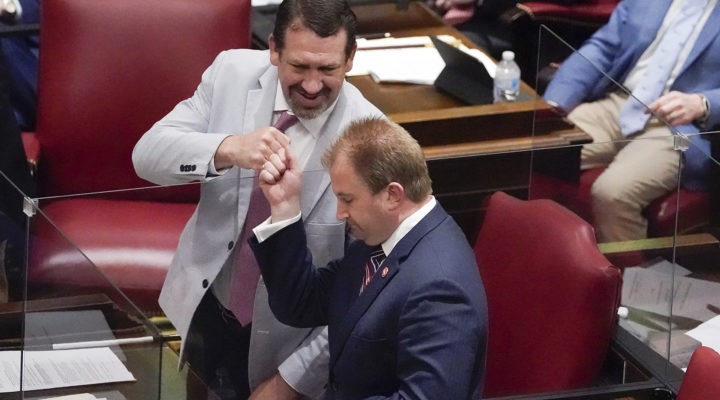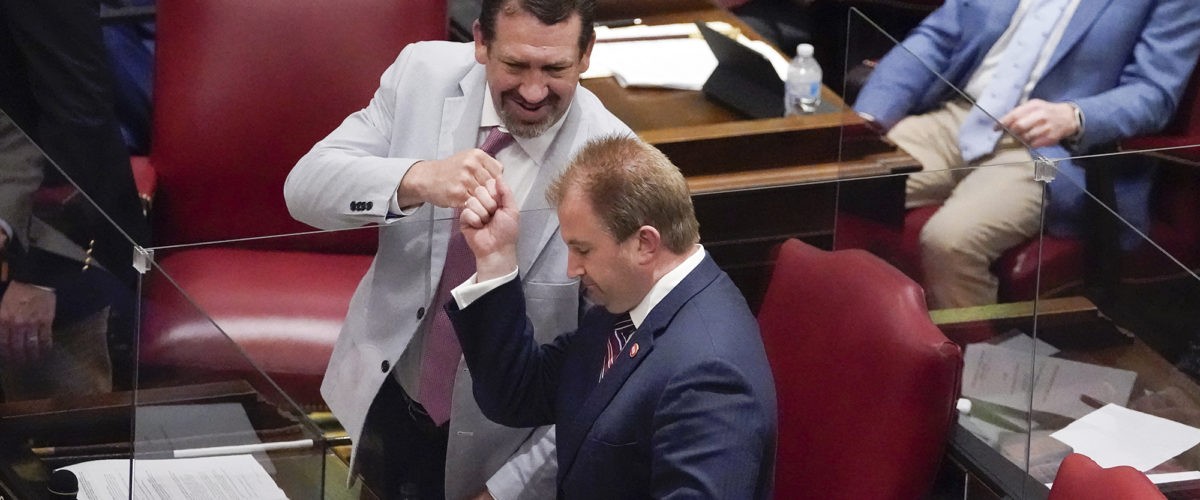Rep. Jeremy Faison, chairman of the Tennessee House of Representatives Republican Caucus, recently wrote his “Viewpoint” regarding House Bill 580, outlawing Critical Race Theory in Tennesse schools. And it was published in the Newport Plain Talk, a local newspaper.
He celebrates the 68 Republican yes votes. However, with all due respect to Faison, I believe, as both a concerned citizen of the U.S. and a resident of Tennesse, that his interpretation of Critical Race Theory is woefully skewed, and further, his support of outlawing the teaching of it in Tennessee schools via House Bill 580 is not only disappointing but stands in direct contradiction to his expressed goal of creating “equality of opportunity” in the state.

Chris Robertson
To be clear, I vehemently oppose House Bill 580, but only because I, like Faison, am also interested in the integrity of my state and am committed to defending her most vulnerable. However, if we are truly interested in protecting the vulnerability of our children, we must first come to terms with our own vulnerability as adults, and this is especially the case for those of us who are white.
The easy thing for us to do is write off Critical Race Theory as dangerous, but the temptation to do so is quite obviously a veiled attempt to avoid what is most necessary, which is to take it seriously, and in doing so come to terms with our racialized history as well as our shared responsibility to create a more just and equitable society.
Faison supposes that Critical Race Theory teaches we are “inherently racist” or “inherently oppressed,” and he further argues that it is not interested in “equality of opportunity” but instead, in “equity of outcome” or “’fairness.’” His primary concern is that these ideas are Marxist (a loaded term which plays off of many of our fears), hence Critical Race Theory will undermine our free-market system and lead to unnecessary division by pitting the “privileged” against the “minoritized.” As a corrective to Critical Race Theory, Faison would like us to believe that individuals hold the power, and that “we control ourselves.”
I’m intrigued with his argument given that he later says, in reference to the Civil Rights Act and Voting Rights Act, that “we course-corrected our mistakes and should be proud of that.” Here, he intimates that not individuals but we as a collective body made the necessary changes in face of societal ills and gross injustices. And ironically, he believes, “we (should be) proud of our history.” It is here that he acknowledges exactly what Critical Race Theory aims to address and leverage, that political power lies in the hands of the collective.
“People with privilege and power would rather create laws and policies that further preserve and protect their privilege, and the status quo, than they would advocate for those who are even more vulnerable than a child who is introduced to Critical Race Theory.”
It seems to me that the reason Faison feels the need to attack and demonize Critical Race Theory is because it underscores a very uncomfortable truth — that we do in fact live in a country wrought with division, and Black-Indigenous-People of Color are disproportionally subject to any and every form of injustice. Perhaps the more uncomfortable truth, to which we are most vulnerable, is that people with privilege and power would rather create laws and policies that further preserve and protect their privilege, and the status quo, than they would advocate for those who are even more vulnerable than a child who is introduced to Critical Race Theory.
Mind you, the course-corrections which Faison is so proud of would not have taken place had not racially diverse, oppressed minorities actively sought out fairness from those who were privileged and in the majority, in spite of retribution and violence. But we wouldn’t want our kids learning that in the second grade would we? If they did, they might actually concern themselves with “equality of opportunity,” having recognized that no such thing has ever existed in our country.
At the end of the day, we are all worse off when we whitewash our history. In fact, to pretend one is colorblind is to cast one’s vote for division. Truth be told, and we all know this to be true, our country’s history is racialized. If we consult our better angels, we all would agree that our kids deserve to know this. However, when we ignore it, and fool ourselves into believing that every individual gets a fair shake, the result is even more misunderstanding, animosity and, sadly, the perpetuation of historical trauma.
If celebrating diversity and working toward a more equitable and inclusive society is a social ill worthy of repute, then I understand why we might exercise caution and adopt a posture of suspicion toward Critical Race Theory. But I believe we can do better.
In this I put my faith, that we might develop a shared resolve to create a world where everyone does in fact have “equal opportunity.” But we have work to do. What is glaringly obvious in our country, as well as in our local communities, is that more and more of us, on every possible side, are continuing to suffer because of our refusal to come to terms with the many ways we continue to divide ourselves.
“If Critical Race Theory taught that we should ‘hate each other over the color of our skin,’ then I would be against it too.”
If Critical Race Theory taught that we should “hate each other over the color of our skin,” then I would be against it too. And House Bill 580 would have my full support. However, Critical Race Theory rightly understood and responsibly taught is actually a tool for cultivating healing and hope. Why? Because it is an invitation to all of us, but especially privileged people like me, to look longer and harder at our individual lives, as well as our shared life as Americans, and to admit before one another that we have not always treated our neighbors with dignity and respect.
We forced people onto reservations against their will. We enslaved people. We denied them the right to vote. We were not perfect. Still, we are poised, as the U.S. Constitution says, “to form a more perfect Union, establish Justice, ensure domestic Tranquility, provide for the common defense, promote the general Welfare, and secure the Blessings of Liberty to ourselves and our Posterity.”
Surely, we can do better. But it will require us to be vulnerable and remain open to the possibility that we have something to learn from everybody, including those who espouse Critical Race Theory. If we could manage that, I would be “proud of Tennessee today.”
Chris Robertson is a resident of Parrottsville, Tenn., and is an ordained minister currently pursuing a degree in social work at UT Knoxville.
Related articles:
Why Critical Race Theory could be good news for ‘nice white people’ | Opinion by Craig Nash
Editing our narratives has the power to heal future generations | Opinion by Mark Wingfield


